
THE VOICE OF INTERNATIONAL LITHUANIA
|
VilNews has its own Google archive! Type a word in the above search box to find any article.
You can also follow us on Facebook. We have two different pages. Click to open and join.
|
Archive for April, 2011
Sending e-mail to Lithuania is like sending it to the black hole of the universe
- Posted by - (1) Comment
 Lithuania's business people and government officials are yet to learn the necessity of good communications. Without a two way communication there is no possibility for further contacts. One of the most frustrating experiences I had was in e-mail (before that it was in regular "snail mail") communications. I would write and write but receive no reply (with only a few exceptions).
Lithuania's business people and government officials are yet to learn the necessity of good communications. Without a two way communication there is no possibility for further contacts. One of the most frustrating experiences I had was in e-mail (before that it was in regular "snail mail") communications. I would write and write but receive no reply (with only a few exceptions).
When I was working, our management had a rule - "answer all letters received in not more than three days. If there is no answer to be given, then at least acknowledge the receipt".
One of my American colleagues, who was sincerely trying to help Lithuania, said "Sending e-mail to Lithuania is like sending it to the black hole of the universe. Everything goes one way and nothing comes back". No wander he is now disenchanted and helping others.
Vytautas Sliupas, P.E.
www.aukfoundation.org
Burlingame, California
Easier to obtain an audience with the pope, than with a minister for foreign affairs of Lithuania
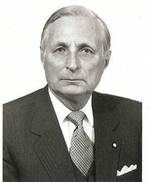 Dear Mr. Myhre,
Dear Mr. Myhre,
I enjoy your positive articles about Lithuania and send them to some 70 friends around the world. The less positive, I keep to myself.
You have lived long enough in Lithuania and must realize that many of the problems of the present day Lithuania are due to their reluctance to learn from the Western countries or accept advice from Lithuanians who lived and studied in the West. The relative success of Lithuania after World War I was largely due to the replacement of Russian educated officials by those who got their degrees in the West. My own father was the first Lithuanian with a degree in forestry from a Western university and introduced major reforms in the forest management, which survived even during the Communist occupation.
Alas, after 20 years of restoration of independence to paraphrase Kipling "The East is East, the West is West and the twain shall never (so far) meet". I spoke to a number of Lithuanians with degrees from top Western universities, who don't want to return to Lithuania - according to them, the "natives" know everything better.
I might add that for me it was easier to obtain an audience with the Pope, than with a Minister for Foreign Affairs of Lithuania.
Yours sincerely,
Ambassador Algirdas Zemaitis
Vilnius – Rome
- Bookmark :
- Digg
- del.icio.us
- Stumbleupon
- Redit it
2011 is the ‘European Year of Volunteering’
- Posted by - (0) Comment
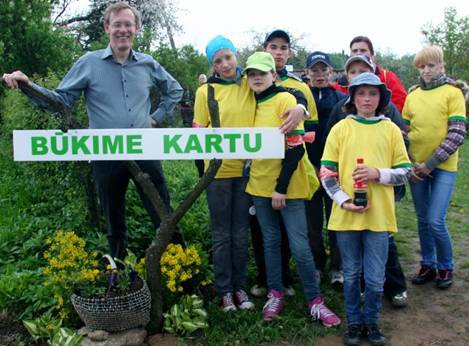
Ambassador Simon Butt (Great Britain) was last year’s patron of the event ‘BŪKIME KARTU’ (‘let’s be together’). The event is organised every May by Vilnius International Club, since 2002, every year bringing more than 100 children from different orphanages and institutions, together with helpers and volunteers from Lithuania’s international community to a farm 26 km north of Vilnius.
The US ambassador hon. Anne E. Derse will preside at the event this year, when an effort will be made to introduce other business and political leaders from other regions of Lithuania so that Bukime Kartu can organically expand throughout all of Lithuania so that many more children can participate in future years. We welcome business leaders, politicians and most of all volunteers to come join us at this year’s event on May 28th at Viva Green Resort. If you would like to know more information about this event, please email us at linas@bangabanga.lt
Text: Linas Ažubalis [linas@bangabanga.lt]
The European Commission has declared 2011 as the European Year of Volunteering. With that declaration I thought it would be a good idea to review volunteer activities in Lithuania, with special focus on the charitable activities from the foreign community within Vilnius as well as the work of the non-government organization Spiritual Guidance Centre for Youth (“Dvasines Pagalbos Jaunimo Centras” - DPJC).
According to EU statistics, there is a large difference between member states regarding their level of participation for volunteering activities. United Kingdom, Sweden and Austria have volunteering rates that are greater than forty percent of the adult population, whereas in Greece, Lithuania and Italy those number drop considerably to a paltry less than ten percent of the adult population. Why such a big difference? The role of culture probably plays a big role, but political and business leadership or lack thereof also plays an important role.
The Vilnius International Club (VIC) is a membership club that attracts expats from around the world who currently reside in Vilnius has written within its mission statement to engage in charitable activities. The VIC had the idea of organizing a day of activities for orphans that would be organized by VIC and its members which include embassies from around the world. The idea was to bring about 100 orphans to one place, which has been a farm located north of Vilnius for the last 8 years hosted graciously by Zina Ginaitiene and make them feel welcome and cared for through a planned day of organized activities. Thus Bukime Kartu (Let's Be Together) was launched. Every year a different embassy takes the honorary lead role to organize the one day event that must seek out over 100 volunteers to make the day run smoothly.
This year Lt. Col. Stephen Timmons from the US embassy is providing organizational leadership for the event along with chairman Torben Pedersen, as well as a handful of other international volunteers. The US ambassador hon. Anne E. Derse will preside at the event and this year an effort will be made to introduce other business and political leaders from other regions of Lithuania so that Bukime Kartu can organically expand throughout all of Lithuania so that many more children can participate in future years. We welcome business leaders, politicians and most of all volunteers to come join us at this year’s event on May 28th at Viva Green Resort. If you would like to know more information about this event, please email us at linas@bangabanga.lt
We would also like to highlight the work of Dvasines Pagalbos Jaunimui Centras based in Klaipeda. (Spiritual Guidance Centre for Youth) DPJC was founded in 1994 by visionary Fr. Ed Putrimas who conceived the idea while living in Toronto. He saw the greatest need for a social program in the port city since the other larger cities had already established programs. After obtaining a grant from the Canadian government, he opened the doors to his center that would reach out to the lives of underprivileged youths and families for years to come. The centers core mission statement revolved around Christian principles and the idea of volunteering to develop social competence among young people and to promote sociability, civic awareness and core personal values. Over time he was able to put together a solid team of social workers and more importantly volunteers who would expand and add programs that would help their community which has been supported by the municipality and other government social programs. In the small confines of the space available to them, DPJC runs a daycare centre for underprivileged families, a Big Brother/Big Sister program, a youth crisis hotline (Jaunimo Linija) as well as “Sniego Gniuzte” which is a prevention program that aims to convince adolescents through activities organized over a weekend that life is fun and is full of meaning without consuming intoxicants. More than 88 registered volunteers and 8 staff members help to run the programs at DPJC. During the last couple of years, as the financial crisis spread around the world, the Lithuanian government and foundations have cut back their funding for such programs. DPJC has tried to maintain their level of commitment to their programs while less and less was available to them via funding. The need for services has not gone away but has increased while more families have been pushed closer to the poverty line. Three years ago DPJC was able to offer youths a learning and computer center, but unfortunately the learning center burned down and since the premise was not insured, the learning center was not replaced. To this day there exists a need to replace the learning center, but ever since funding dried up, the center has become a distant memory with no way to replace it.
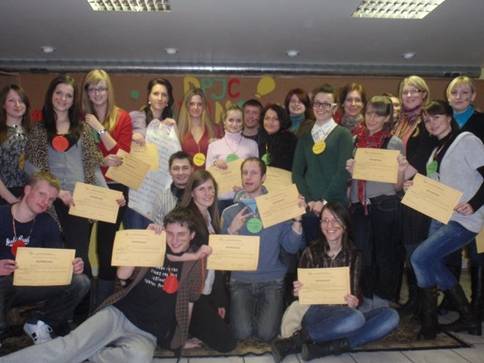
Klaipeda’s Dvasines Pagalbos Jaunimui Centras (Spiritual Guidance Centre for Youth) DPJC was founded in 1994 by visionary Fr. Ed Putrimas who conceived the idea while living in Toronto. He saw the greatest need for a social program in the port city since the other larger cities had already established programs.
The youth crisis line ("Jaunimo Linija") is linked to three cities - Vilnius, Kaunas and Klaipeda, and collectively 93 000 calls and 1 600 letters were answered last year. That equates to over 250 calls and 4 letters each day of the year. On average, one out of every seven callers seeks help because they are suicidal. That's about 36 people per day. To make matters worse, Lithuania has the highest suicide rate in the world (according to WHO from 2008). DPJC realizes this grim statistic and is doing everything within their abilities to help these struggling youths maintain the will to live. Keeping these youths engaged in activities with a feeling of belongingness is one of the main objectives of DPJC.
If you are able to donate old computers, office equipment, sports equipment or toys, DPJC would gratefully accept these items. Also monetary donations could be sent to Darzelio g. 11, Klaipeda LT-93195.
Otherwise we graciously ask working individuals in Lithuania to donate 2% of their taxes to DPJC http://www.dpjc.lt/index.php?page=skirkite-2-dpjc-veiklai, which is a way of helping without opening your wallet, (https://deklaravimas.vmi.lt/lt/Pradinis_Prisijungimo_puslapis/Prisijungimasperisorinessistemas.aspx) but do so quickly because the deadline is May 1st. Tres Mexicanos restaurant, a support partner of DPJC, will provide a 30% discount coupon for anyone who offers a donation in any form, but you must come to Vilnius to use it. Please send the editor a confirmation email at editor@VilNews.com and a coupon will be sent to you.
- Bookmark :
- Digg
- del.icio.us
- Stumbleupon
- Redit it
![]()
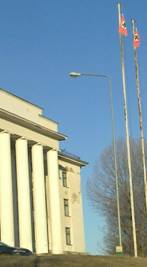
Nazi flags again raised in Vilnius.
Picture source
http://pilietis.delfi.lt/news/ahitlerio-gimimo-diena-vilniuje-iskeltos-treciojo-reicho-veliavos.d?id=44607483
VILNIUS (AFP)---Lithuanian authorities slammed a string of incidents where anti-Semitic slogans were found near a synagogue in Kaunas and Nazi German flags raised in Vilnius to mark the 122nd birthday of Adolf Hitler on the 20th of April
"We strongly condemn the display of Nazi flags and slogans," Lithuania's foreign ministry said in a statement.
"They are an attack on the Lithuanian state and civil society. They incite hatred toward the Lithuanian Jewish community and should be treated as a provocation against Lithuania," it added.
Irene Degutiene, the speaker of parliament, said in a separate statement that she "resolutely condemns such repeated racist and chauvinist attacks" and hoped the masterminds and perpetrators would be caught and punished.
"Such incidents serve to discredit any healthy patriotism and nationalism," she said on the parliament's website.
Early Wednesday, three flags with Nazi Germany's swastika symbol were found raised on a hill close to the centre of the capital Vilnius and another one on a bridge on the city's outskirts, police said.
The other incident occurred in Lithuania's second city, Kaunas, where "Hitler was right" in Lithuanian and the German-language "Juden Raus" (Jews out) were found on a banner left near a synagogue.

This banner was found at a Kaunas Synagogue, saying "Hitler was right" in Lithuanian, and in German, "Juden Raus" (Jews out)
Source: Lituvos Rytas
http://www.lrytas.lt/-13032829551301681630-kaune-prie-sinagogos-neonaciai-pakabino-plakat%C4%85-su-%C5%A1%C5%ABkiais-juden-raus-ir-hitleris-buvo-teisus-papildyta.htm
Lithuania was once home to a thriving Jewish community of 220,000, with
Vilnius a hub of learning known as the "Jerusalem of the North". But 95 percent of Lithuania's Jews perished during the country's 1941-1944 German occupation at the hands of the Nazis and Lithuanian collaborators who saw Hitler as a bulwark against the Soviet Union.
Today there are around 5,000 Jews in Lithuania, of whom around 500 live in Kaunas, according to Lithuanian-Jewish community organisations.
Nazi Germany dictator Hitler was born in 1889 and killed himself in 1945 just days before his regime's defeat in World War II. His birthday on 20 April is seen as a key commemoration day by neo-Nazis around the world.
- Bookmark :
- Digg
- del.icio.us
- Stumbleupon
- Redit it
Lithuanian lawmakers get even more gay hostile
- Posted by - (1) Comment
![]()

The author of the anti-gay law, Parliament Member Petras Gražulis
Lawmakers in Lithuania's Committee on Legal Affairs voted last week to make even more stringent censorship legislation, saying that they should be able to fine people for the "propagation of homosexual relations" in public. This has earned condmentation from EU groups who say this is just another step in furthering a ultra conservative, anti-LGBT agenda.
From UK Gay News:
"This is a one more warning act of institutionalised homophobia which prevails among Lithuanian lawmakers," commented Valdimir Simonko, chair of the national LGBT advocacy association Lithuanian Gay League (LGL).
"Such kind of legislative proposals are totally unacceptable in the context of the legally binding Charter of Fundamental Rights which clearly prohibits any discrimination on the ground of sexual orientation.
"We urge European Commission as the guardian of the Lisbon Treaty to intervene immediately," he pleaded.
Lawmakers have attempted to raise support among orthodox religious groups, asking that they publicly encourage parliamentarians to approve the changes.
In a letter to church leaders legislators said that these laws are necessary in combating "forms of sinful lifestyles" present in society, adding: "the ideology of homosexuality is one such form and is unacceptable to believers, contradicts the concept of the family, the marriage of man and woman, the natural law established by the Creator, the Constitution which considers family the foundation of the Lithuanian state, and the catechism of the Catholic Church which emphasizes that homosexual relations contradict the natural law and close the sexual act to the gift of life. In addition, we can state that this position of the Church also arises from the notion of homosexuality as a grave perversion in the Bible.”
The letter also says that freedom for citizens should not be misinterpreted as allowing for the degradation of family, hinting that freedom must be curtailed when citizens risk going astray from the ideal of family life.
Lithuania has already raised the ire of the international community for proposing a complete ban on gender reassignment surgery for trans people so as to negate a European Court of Human Rights ruling.
Its censorship law, that this change would aim to add to, has also been widely criticized for its overreaching nature and the way in which it not only bans the ill-defined term propaganda but is also being used to stifle free speech.
This move will likely add to the protestations that Lithuania should have its power as a member state of the EU curtailed until such a time when it is willing to work within the limits and responsibilities of international law.
You can read more on Lithuania's proposed ban on gender reassignment here.
- Bookmark :
- Digg
- del.icio.us
- Stumbleupon
- Redit it
Crisis over?
- Posted by - (0) Comment

In its latest EU10 Regular Economic Report, the World Bank predicts that economic growth in Lithuania will be 4.3 % in 2011 and accelerate further in 2012, thanks to “low pre-crisis imbalances, deep integration into European production networks, EU funds and solid consumption”.
The bank predicts Lithuania’s growth to be on the very top amongst the EU10 countries.
According to the bank, Lithuania, Estonia and Latvia are likely to build on the export-led upswing as domestic demand continues to recover, with growth of from 3.3 to 4%.
Romania and Bulgaria, where the crisis hit later than elsewhere, will recover some of the lost ground, with growth set to accelerate in 2012 to 3.4% in Bulgaria and 4.4% in Romania.
The performance of Slovakia and Poland is set to remain solid thanks to low pre-crisis imbalances, EU funds, and, in the case of Poland, solid consumption. Growth rates will top 4% both in 2011 and 2012,
Finally, growth in Hungary and Slovenia is likely to increase at a more measured pace of between 2.2 and 3, while the Czech Republic is set to witness a slowdown.
Despite the favorable economic outlook, the EU10's growth prospects remain subject to risks, the study stresses.
"By the end of 2010, only exports had recovered to pre-crisis levels. Private investment remains weak in view of feeble demand, the winding down of construction projects and tight international financial conditions. (..) In addition, the EU10 recovery is still jobless, as labor markets continue to be slack," the World Bank report said.
The EU10 Countries
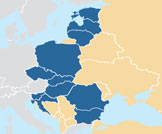
Eight Central European countries joined the EU in 2004: the Czech Republic,Estonia, Hungary, Latvia, Lithuania, Poland, the Slovak Republic and Slovenia. Bulgaria and Romania joined the EU in 2007. Croatia began EU accession negotiations in October 2005.
- Bookmark :
- Digg
- del.icio.us
- Stumbleupon
- Redit it
We strongly oppose such “improvement” of business conditions from the government
- Posted by - (1) Comment
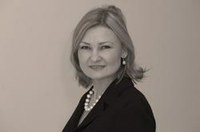
Rūta Vainienė
The Government has given the go-ahead to the idea of the bankruptcy of natural persons, but it still needs to be endorsed by the Parliament. Therefore we warned the legislators once again that this move would be unsound since it would foster people’s irresponsibility, provoke living above people’s financial capacities and engender other negative results. The government is constantly speaking about improving the business climate; however, speeches remain speeches and, on top of that, authorities devise new regulations and sanctions for corporate executives. We strongly oppose such “improvement” of business conditions and propose other solutions.
We reminded the policy makers about the inveterate flaws of the social security system (Sodra), also highlighting that sweeping changes need to be undertaken to amend the situation.
More information on our activities can be found in our webpage www.freema.org.
Rūta Vainienė
President,
Lithuanian Free market Institute
- Bookmark :
- Digg
- del.icio.us
- Stumbleupon
- Redit it
![]()
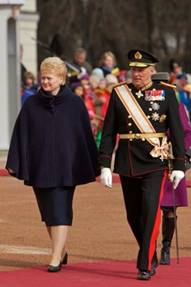
President Dalia Grybauskaite and King Harald V of Norway attend the official welcoming ceremony at the Royal Palace during Lithuanian state visit to Norway in early April.
Norwegian Aftenposten writes today that craftsmen from Lithuania worked 210 hours for NOK 3400 (EUR 425). – A bad example of social dumping, "says the Norwegian Labour Inspection to the newspaper.
Two craftsmen worked 209.5 hours for NOK 3400 (EUR 425) by the company Norwegian Batilja Service Team (NST) . This equates to an hourly rate of NOK 16 (EUR 2).
Norwegian labour authorities call it "a bad example of social dumping." Legal adviser in the Norwegian Labour Inspectorate, Kjersti Marie Gjerde, says to www.Aftenposten.no that NST already in 2008 were caught in a similar case, a case still pending in the courts.
NST Batilja, which is part of the NST group, took legal action after receiving the Labour’s order in 2008, but lost the case in the Oslo City Court at the end of 2009. The company appealed the case to the High Court.
On its web site writes that the NST Baltija is "a company located in Vilnius, Lithuania, with business units in the rental of workers from Eastern Europe to Scandinavia, as well as activities within the health, care and domestic services."
Managing director Jan Thorstensen in the NST Group tells www.Aftenposten.no that he will not comment.
I have personally heard of several such cases in recent years, and I’m afraid that it is a rather widespread phenomenon that Eastern European craftsmen and workers within other fields are exposed to ‘slave wages’ and degrading working conditions in many Western European countries.
An extensive clean-up should be implemented as soon as possible – in close cooperation between the countries involved.
Aage Myhre
VilNews Editor-in-Chief
- Bookmark :
- Digg
- del.icio.us
- Stumbleupon
- Redit it
Arturas Zuokas elected Vilnius mayor
- Posted by - (0) Comment
![]()
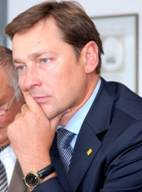
The Vilnius City Council has voted Arturas Zuokas as the new mayor of the capital city, a position he also held from 2000-2007.
Zuokas' return to the post marks an incredible turnaround following a bribery conviction in 2008.
Zuokas, the former leader of the Liberal and Centre Union, secured 26 out of 51 votes in the council on April 19. In the municipal elections earlier this year he received the most mandates in the city, making him a leading contender for the mayor's post despite his bribery conviction.
Source: http://www.baltictimes.com/news/articles/28488/
- Bookmark :
- Digg
- del.icio.us
- Stumbleupon
- Redit it
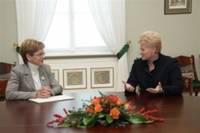
Poland’s foreign ministry expressed this week concerns about ‘a growing atmosphere of enmity between the two neighbouring countries’ to Lithuania’s ambassador to Poland, Loreta Zakarevičienė, here with President Dalia Grybauskaitė
Poland's foreign ministry summoned the Lithuanian ambassador in Warsaw on Tuesday to express concern over the treatment of its Baltic neighbour's Polish-speaking minority.
The move is the latest sign of increased tensions between the two countries, which are both members of the European Union and of NATO, over a growing list of complaints, including the treatment of ethnic Poles and Polish investors in Lithuania.
The ministry said it had expressed concern to Ambassador Loreta Zakareviciene about "a growing ... atmosphere of enmity" in Lithuania towards its Polish-speaking population.
Vilnius has already distanced itself from recent nationalistic comments by some Lithuanian educators cited by Poland.
"We should not let radicals prevail. The (Lithuanian) government wants emotions to be left aside, so the normal dialogue (with Poland) continues," said Virgis Valentinavicius, a spokesman for Lithuania's prime minister.
The two countries have had generally friendly ties since the fall of communism in 1989 and Lithuania's regaining of its independence in 1991 after the collapse of the Soviet Union.
But Warsaw has long fretted about the rights of the Polish minority in Lithuania, which makes up around 7 percent of the small Baltic republic's population, over issues ranging from the spelling of Polish names to land disputes and education.
Tensions have been exacerbated by complaints from Poland's top refiner PKN Orlen (PKNA.WA: Quote), which is considering selling its Lithuanian unit, accusing Vilnius of failing to ensure it more accessible oil supplies.
Source:
http://af.reuters.com/article/energyOilNews/idAFLDE73I1O620110419
- Bookmark :
- Digg
- del.icio.us
- Stumbleupon
- Redit it
Easter magic!
- Posted by - (1) Comment
EASTER MAGIC |
|
- - Burial ceremony of 13 January events victims in Vilnius, 1991 - -
|
What made the strongest impression on me while we walked around in the Old Town this Easter day in 1991 was the fact that the Lithuanian people again had gathered in large flocks in and outside the city's many Churches. There was far from room enough for all indoors, so the Churches had hung out loudspeakers for the congregations and audiences to follow the church services even from a distance. Grief was still noticeable, but now it was the renewed hope and faith in an independent Lithuania that first and foremost characterized the mood. It was just fantastic to see so many people gather to listen to sermons and sing hymns, but first of all unite in joint prayers for a new future for their beloved homeland.
Today, nineteen years later, the speakers are taken down from the churches' walls. There is now plenty of room inside for all who wish to attend Easter church services.
But Easter is celebrated! Over the entire country, Lithuanians follow their ancient traditions, as described below. I have personally experienced many warm and happy such celebrations with my family here. The magic of 1991 is not present in the same way anymore, but the strong traditions are still magical in their own way.
My children love to participate actively with grandfather when he decorates the Easter eggs of the year (he also keeps an amazing collection from previous years, great artist as he is), and enthusiasm is always great when we roll and break eggs before we finally sit down to enjoy the adventurous Easter meal. The good, long lasting traditions are some of the most distinguishing characteristic of this country, and Easter is perceived as the most distinctive of all holidays celebrated throughout the year.
I wish you all a Happy Easter!
Aage Myhre
Editor
LITHUANIA'S VELYKOS (EASTER) TRADITIONS

The word for Easter, Velykos, has been borrowed from Byelorussian and means "important day." The word is very accurate because Easter is the year's most solemn feast in Lithuania. Easter is not only the feast of Christ's Resurrection, but also nature's awakening from the winter's sleep.
The early Eastern morn, just before dawn, abounds with magical power. Much of this magic is concentrated in flowing water. Bathing in such water before sunrise prevents all boils, sores, rashes and other skin ailments. If it rains on Easter morning, it is necessary to stand bareheaded in the rain to ensure good growth. Small children who want to grow quickly are reminded of this.
As the sun rises on Easter morning, it "dances" swaying from side to side and changing colour: from green to blue, to red and then golden yellow. This phenomenon can be seen by rising before dawn and watching for the sun's first appearance on the horizon.
Earlier everyone went to the Resurrection services. If on the way you passed a woman, you'll have an accident. To avoid calamity it was necessary to turn around, return home and then take another road to church.
In Lithuania the Easter morning procession was usually conducted around the church. It was very solemn: church flags were held high, girls strewed flowers, the choir and all the people sang, alternating with a brass band, and the church bells pealed loudly. Three turns were made while singing the Lithuanians' favourite Easter Hymn Linksma diena mums prašvito (A Happy Day Has Dawned for Us). After the services, a blessing was made over the Easter food which was arranged in baskets decorated with greens and placed on the altar-rails.
At the conclusion of the liturgy in Church, the people hurried home. In fact, all large and small roads, every path was the scene of races: whoever arrived home first would be successful all year and would complete all work on time. Even persons walking tried to pass those ahead and reach home first. It is not surprising that accidents happened during such races. Perhaps that is why it was said that a woman met on the road brings disaster (someone had to be blamed!).

At home, Easter breakfast was eaten. The meal began when the homemaker peeled a blest Easter egg, cut it and gave a piece to every member of the family. This was done so that peace and love would always reign within the family and everyone would live in harmony. Afterward, a variety of other dishes were consumed: meat, sausages, and cakes. On Easter it was necessary to eat well and to satiety, to "recover from Lent" because of the fast all through Lent. If the area had poor families with no Easter food, their neighbours shared what they had and brought the disadvantaged families everything they need to be satisfied and happy.
Children hunted for hidden Easter eggs left for them by the Velykų Senelė (Easter Granny) or Velykė. Bunnies who painted Easter eggs were also a familiar fixture, but they were only helpers for theVelykų Senelė. Very early Easter morning they loaded Easter eggs into a beautiful little cart pulled by a tiny swift horse. The Velykų Senelė used a sunbeam as a whip. Sometimes the bunnies themselves pulled the cart laden with Easter eggs.
The Easter Granny travels around the country, stopping in every child's yard to leave eggs in baskets placed or hung for that purpose. When they awake, good children find beautifully decorated Easter eggs (and in. more recent times even sweets). Bad children only find a single plain completely white egg. If this happens, the child is disgraced. His friends and family laugh at him. Sometimes bunnies accompany the Granny and help her distribute the Easter eggs. They are kept busy not only before Easter and on Easter day, but all year round baking cookies for children. When parents leave their children behind, they promise to bring them a gift, bunny cookies. Upon their return, they tell the following tale:
"I'm walking through the woods (or orchard or past the bushes) and I see a bunny wearing an apron and hat, his sleeves rolled back, taking sweet-smelling cookies from an oven. I say to him: 'May the Lord help you!' He answers, 'Thank you, thank you. Would you like a taste? They're still hot.' Of course, I dol They smell so good, they look so good. . ."
In the meantime the-child can hardly control himself: "What kind of oven was it?" "Tiny, pretty." "Did you get to taste any cookies?" "Yes, of course." "Did you bring me any?"
At this point, the father, mother or other family member pulls out the goodies and distributes them to the children who are extremely impressed not only by the bunny cookies but also by the baking method itself. They can practically see the flushed, rushing bunny mixing the dough and stoking the oven. How wonderful that morn or dad just happened to be passing at the very time the cookies were done!
Bunny cookies are famous throughout Lithuania. It would be good to remember them outside Lithuania as well.
A variety of games were played with Easter eggs. The simplest is an egg-breaking contest. Two players face off, each holding an Easter egg and hit each other's egg. The one whose egg remains intact is the winner. The egg is held in the fist so that only its tip protrudes. The other player hits it with the tip of his egg. If the egg breaks on the side, the impact was wrong and the owner of the broken egg is not considered the loser. The winner claims the broken egg. After the game the number of eggs won was tallied. It was of paramount importance to have a hard-shelled egg that withstands breaking. In selecting a strong egg, the contestant taps an unboiled egg against his teeth. If the sound is clear and sharp the shell is hard: if dull and muffled, the egg will break quickly; it's not even worth colouring.
Some smart alecks devised an "unbreakable" egg. It was made this way: a raw egg's shell is pricked at both ends. A thin straw is inserted into one end and used to blow out the contents through the opposite end. Another straw with one end shaped as a funnel is then placed into the hole and melted pine or fir sap is poured until the egg is full. If the sap does not flow smoothly, a helper inserts a straw into the opposite hole and draws the air out of the egg. After the egg is filled with sap, the holes are carefully concealed and the egg is then tinted along with others. It weighs about the same as a real boiled egg. Sometimes the empty shell was filled with melted sugar, but it was much heavier and the sugar hardened unevenly making it more difficult to play. Of course, if caught, the cheat was punished. The direst penalty was to eat the "Easter egg."

Another amusing Easter game was egg rolling (picture above). This was best done outdoors, but also could be played in a larger room. A trough is made from pieces of wood or bark to measure about 10 cm long and 15 cm wide (it can also be much longer). One end of the ramp is propped up to produce a downward incline, but not too steep. A small circle is drawn at the bottom of the slope for the playing field into which the eggs will roll. When the game is played outdoors, the trough must be placed on a smooth surface because the eggs will not roll in the circle if there are pebbles, high grass, etc. When played indoors, the surface of the circle must not be too slippery for the eggs will roll out. A low wall or enclosure may be built around the circle. When all the preparations are completed, the players begin the contest. Four to eight persons play. Each uses an egg of a different colour to tell them apart. Eggs may also be marked in different ways. The egg is let down the incline. After one contestant finishes, the next rolls his egg aiming to reach the other's egg and tap it. If the egg hits the first one, its owner wins and takes the first egg. The eggs are rolled down the slope in turn. A contestant who wins egg rolls out of turn until his egg fails to hit another. Another player then takes his egg from the circle and rolls it.
Eggs used in the rolling contest may already be cracked (for instance, already used and won in an egg-breaking contest), but their sides should be intact because eggs with cracked sides do not roll well. The trough may be straight or curved in different ways to make the eggs roll longer. The slope may also be made of cardboard from an old box, plastic or any other material strong and rigid enough to support the weight of an egg.
A simpler egg-roll is done without a trough. A circle at least one meter in diameter is traced on a smooth surface. Barriers or enclosures are placed around the circle to keep the eggs from rolling out (crumpled newspaper may be used). A gate is kept open on one side through which the players push their eggs. The first player is chosen by lot. He rolls his egg into the circle. The second player attempts to roll his egg so that it will tap the first one. The game is played like the one using an incline, but in this case the eggs are rolled into the circle by hand with the player kneeling or sitting on the ground. Because the egg does not roll down a ramp, the entire game depends on the contestant's skill, how he rolls his egg into the circle. If the egg is rolled so hard that it leaves the playing field, the contestant loses his turn.
In the past, only young men and adolescents played egg-rolling contests. It was not proper for girls to do so. They provided their beaus with eggs, cheered the contestants on and guarded the eggs won. Today mostly children (boys and girls) roll eggs.
If guests arrive on Easter, they are given Easter eggs as gifts. The guests also bring an Easter egg for each family member (or at least the hosts and sweets for the children). Easter morning children go "egg begging" but only to the homes of acquaintances, close neighbours or godparents. When they arrive, they say hello and stand silent at the door. It is quite obvious to everyone that an Easter egg is required. The children politely say thank you, wish a Happy Easter and continue on. When Easter was celebrated for three days, no one went visiting the first day; it was unacceptable to intrude upon people on such a holy day as if someone had thrown you out of your own home.
The first day of Easter was said to be dedicated to God, people were expected to conduct themselves seriously and quietly, spend time with their family, eat well and "recover from Lent." The second day was for recreation, visiting friends and having company. The third day was devoted to relaxation. People slept late, recovered from all the merrymaking because work was waiting in the wings.
For Easter, homemakers set out Easter dishes which remained on the table all day. When guests arrived, the women could then spend time with the company and did not need to work. The table was covered with a white cloth and decorated with greens or fruit tree branches (mostly cherry) which were cut and set in water several weeks earlier so they would bloom for Easter. (Easter lilies were unknown.) Greens were also attached to the tablecloth hem which hung down from the table. The table was laden with cold Easter dishes: baked ham, goose, suckling pig, a basket or plate full of Easter eggs, sweet cheese, bread, cakes, etc. Beer (mostly homemade), liqueurs and cider were served as beverages.
Everyone who arrives to extend Easter greetings must be served. It was considered very impolite for the guest to refuse refreshment. Everything had to be at least sampled and the cook praised, else she would feel insulted.

The young who behaved with such solemnity all during Lent wanted to have fun on Easter. They assembled at a larger house to sing and dance. This usually was done in late afternoon or evening. During the day, it was popular to swing in swings and sing. If the Easter weather was warm and fair, the swings were hung from a tall tree so the young could swing higher. Given inclement weather, the swing ropes were tied from barn rafters. People swung not only for the fun of it but to ensure a good harvest next summer, just as on Shrove Tuesday. While swinging, the girls and young men sang special songs.
A group of young men assembled to practice singing Linksma diena mums prašvito (a popular Easter hymn), some other songs and make the rounds. These are the so-called lalauninkai (from lalauti — to talk loudly and much). In many other countries, such as the United States or England, carolers make the rounds before Christmas singing Christmas carols and songs. They may be compared to Lithuania's Easter lalauninkai.
These singers are usually unmarried men sometimes accompanied by a fiddler or harmonica-player. Upon arriving at a house, they first sing an Easter hymn; convey their Easter wishes and then carol. The homemaker gives them cake, sausages, Easter eggs while her husband serves liquid refreshments. The Easter eggs are handed out by the young girls of the household. Although most homes were visited, it was predominantly those with unmarried girls. They were told before Easter that the singers would arrive and tried to make beautiful Easter eggs. This was a perfect opportunity to display their talents and show off before the other village girls. It sometimes happened that the singers refused to accept an Easter egg judged to have a poor appearance and this was considered a major disgrace.
The songs these carollers sang were noted for the refrains repeated after every verse. The verses were short, usually composed of only two lines. The refrain had no connection with the song's overall content. These singers were especially well-known in Dzūkija which is famous for similar types or harmony songs.
On the hill a pear tree stood; under the pear tree lay silvery dew. . . The refrain — vynelis vyno žaliasai — refers to new wine.
It is not necessary for lalauninkai to sing the customary ditties, other songs may be selected.
On Easter, a person can learn the following summer's weather, about his personal happiness and gain protection against various pests if he knows what to do and what guesses to make.
- If he wishes to avoid seeing snakes all summer, he must avoid seeing a needle the first day of Easter.
- If an accident or calamity occurs on Easter, things will go wrong all year, the year will be unlucky.
- We've already mentioned the races home from church on Easter morning: anyone who arrives home first will be first to complete all work, everything will go well for him (especially work in the fields).
- Prayers are said to be really heard on Easter, it is therefore necessary to pray a great deal.
- If Easter morning is sunny and beautiful, the summer will be fair and the weather good; if it rains (or snows) bad weather is to be expected. The worst sign is to hear thunder on the first day of Easter but even this evil may be found to have a "silver lining." If thunder rumbles before leaves have sprouted (trees very rarely had leaves in Lithuania at Eastertime), thieves will have a difficult time plying their trade that year.
- If the sunset is very red, dangerous thunderstorms may be expected that summer.
http://lithuanian-american.org/educate/tradicijos/velykos.html
EASTER EGGS – MARGUČIAI
 |
 |
 |
Decoration of Easter eggs - margučiai - is a very ancient custom in Lithuania. At the foot of the Gediminas Hill in Vilnius archaeologists have found eggs made of bone and clay, which shows that this custom was known in Lithuania as early as the 13th Century. Easter eggs are also mentioned by Martynas Mažvydas in his dedication to his book "Hymns of St Ambrosius" (1549). Easter eggs were particularly popular at the turn of the 20th Century. They were decorated both by grown-ups and children, by rich and poor. Some were dyed in a single colour, some were decorated with patterns.
Decorations are produced by painting patterns on warm eggs with the tip of a stick or a pinhead dipped in hot wax. Droplet-shaped strokes are grouped in patterns, twigs of rue, little suns, starlets and snakes. The most frequent pattern is that of a sun, like those on large and small distaffs. Smaller patterns are joined by dots and wavy lines into larger ornaments. Their combinations are so varied that is is impossible to find two identical Easter eggs. Every village has its own best egg-decorators.
- Bookmark :
- Digg
- del.icio.us
- Stumbleupon
- Redit it
- Posted by - (9) Comment
Easter traditions
LIETUVIŲ VELYKINĖS TRADICIJOS

From reading Aage‘s thoughtful words about Lithuanian Easter traditions it tranformed me back in time to when I was a young boy growing up in the Boston area of Massachusetts. Being the son of a Scottish mother and Lithuanian father I had the great fortune of experiencing the wonderfull traditions of not only the Lithuanian people but that of the Highland Scott‘s as well.
While along with the Lithuanian Christmas traditions we practiced many of the Scottish customs for Christmas and New Year as well but Easter is seemed was a time for the traditions of our Lithuanian ancestors. These were the traditions the Karnila family took with them from our ancestral home in Lithuania, the village of Guronys.
While occasionally we would visit members of my mother’s family on Easter, most often on Easter we would go to the home of my father’s sister, Ana (Karnilytė) Savanovich. This I think was by no small coincidence since months before Easter my brother and I would plead to our parents that it was an absolute requirement that we celebrate Easter at Aunt Ana’s house – as you read on you will understand why!!!
When we arrived at Ana’s house my brother and I were greeted with a basket of decorated Easter Eggs and sweets. This was of course, in true Lithuanian tradition, AFTER we had we had completely passed through the door and were standing inside the house and had also gone through all the kisses, hugs and pinches on the cheeks (from Ana) and handshakes from her husband John. As my brother and I started to go to work on the sweets and admire the eggs next came another big treat. Ana would come out with a tray of freshly baked, still warm cookies baked by you guessed it – the Velykos Kiškis!!! Now I guess the story behind the cookies from what Aage told you got changed a bit on its trip across the Atlantic Ocean but it seems that the Easter Bunny / A.K.A. Velykos Kiškis baked these cookies just this morning and brought them to Ana‘s home knowing that me and my brother would be there.
After enjoying ourselves on the sweets and cookies next came the what was probably one of the biggest events of the day – EASTER DINNER!!! I grew up enjoying Lithuanian traditional food but at Easter this was something completely different. Easter Dinner was the jack pot, the mother load, the meal to end all meals, the trip to the mountain top. Never at any one time were there so many Lithuanian dishes on the table at any one time. Remember on Chirstmas Eve there is no meat. For Easter there was every kind of meat you could think of. Roast pork, roast ham, roast chicken, roast anything you could possibly roast and maybe a few things you wouldn‘t want to roast. In addition blynai, dumplings, kugelis, salads of every variety you could imagine and of course mushrooms used in almost every dish. The table cloth was always white and always was adorned with some greenery. Now of course before we partook in this wonderful feast an egg was cut and a piece was given to every one seated so that as we all ate of this egg we joined as a family and bonded our love and dedication to each other. I must mention that the cutting of the egg became an art form if we had the pleasure of being joined by uncles Kaziemiras (Charles) and Jonas (John) and aunts Marytė (Mary) and Alicija (Alice) and their families. To cut one egg into about thirty equal pieces is truly an endeavor. After the meal came an incredible assortment of cakes, pies and sweets. Oh, did I mention that to wash this all down Ana had made some home made gira?
After stuffing ourselves to the max came some activities to work off all the food. It seems that the Velykų Senelė/Easter Grandmother had stopped by earlier that morning and left some beautifully decorated eggs for me and my brother. The problem was that she had hidden them outside and our task was to find them. As a very young child this was a little confusing because I thought it was the Easter Bunny’s responsibility to deliver all the eggs to every one. So I kind of sorted things out and came to the conclusion that yes in fact delivering the eggs was the Easter Bunny’s job however the eggs used in the egg hunt was the responsibility of Velykų Senelė. As I got older we then understood that this was another wonderful tradition of our people. I can say one thing about Ana and John, when it came to hiding eggs they displayed some incredible imagination not to mention athletic ability. You would not believe what we had to go through to get some of these eggs!!! To be honest, I don’t know who had more fun, the children finding the eggs or Ana and John watching us.
After finding all the eggs or let me put it this way, after finding all the eggs we could find (I think after fifty years there are still some unfound eggs sitting around there some where) we went back inside. All the children counted up the eggs they had found and the one with the most received some sweets as their prize for being the best egg hunter.
What came next was to me the most special event of the day. Of everything we did this is what I most fondly remember of our Easter traditions. For every child Ana had made a specially decorated egg. She would go around and present each child with this incredible work of art. All the children had the same reaction. We would just sit there with our mouths agape and admire this wonderful creation. As you can imagine, it is difficult for young children to appreciate hand crafted beauty, especially little boys, but these eggs where so magnificent it truly got our attention. We would hold the egg in our hands and just stare at it in wonderful admiration. In addition to the eggs beauty we also were appreciating the love that aunt Ana had put in to making this egg for us but most of all, as we sat there admiring the beautiful Easter egg we, even as little children knew we were holding the tradition of the Lithuanian people and of Lithuania in our hands. I so vividly remember holding these special eggs in my small hands and saying to myself – This is Lithuania and I am Lithuanian.
I would please ask you to understand that what I wrote of is not about me and not about the Karnila family. What I wrote about was a Lithuanian family, Lithuanian traditions and Lithuania. For every people, their traditions and customs are not only an important part of their past but also an important part of their future. This is so true of Lithuania. The preservation of beautiful ancient traditions has been one of the things that helped the Lithuanian people remain strong and preserve their identity as a people and a nation through so many adverse situations. Unfortunately, every year some of these traditions tend to slip away one by one. While we still practice some of these traditions many have become just a memory.
I wrote this as an invitation to all our readers to write to us telling us about the beautiful Lithuanian Easter traditions that you remember from years gone by and also tell us of the traditions you, your family, friends and neighbors still practice to this day. It is our hope that in sharing these traditions with all our readers you will be reminded of some wonderful tradition from the past and this Easter and for many Easters to come you will again include these traditions in your Easter celebrations. We would also like to remind you that there are many people of Lithuanian nationality living around the world that are desperately trying to find out more about their heritage and about the culture and traditions of their Lithuanian ancestors. By sharing your traditions with all our readers it is very possible that a person, intensely proud of their Lithuanian ancestry, some where in the world this Easter will for the first time in their lives be able make some Lithuanian Easter traditions a part of their family’s celebration of the resurrection of Christ.
So dear readers, we invite you to please send to us some of the Lithuanian Easter traditions that are or were an important part of your family so that we can share them with Lithuanians around the world.
Su Dieva
Vin / Vincas Karnila
Associate editor
- Bookmark :
- Digg
- del.icio.us
- Stumbleupon
- Redit it
Venclova`s Vilnius (3)
- Posted by - (1) Comment
The history of the amazing Lithuanian city written by the great poet most qualified to write about it. This book includes a dialogue between the author and Nobel Prize laureate Czeslaw Milosz about the city. An absolutely indispensable work on the city that produced John Gielgud, Bernard Berenson and the Budapest String Quartet.
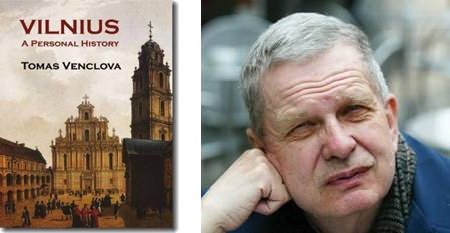
This is the third in a series of excerpts from Tomas Venclova’s book “Vilnius a Personal History”:
PAGAN LITHUANIA
In world history, the year 1323 does not stand out in any way, but it is worth remembering that this was the period when the Renaissance was beginning in Europe: Dante had been dead for two years; Petrarch was just nineteen years old; and Giotto was fifty-six. (He had already painted the frescoes in Padua and Assisi.) That same year, Count Orgaz died in Spain. According to tradition, two saints assisted in a wondrous manner at his funeral ― much later this became the subject of one of El Greco’s most famous paintings. At the same time Vilnius was being founded, another famous heathen capital was established at the other end of the world: Mexico’s Tenochtitlan, only to be destroyed two hundred years later by Spanish conquistadors.
In the Europe of that time, Lithuania was an amazing exception. Similar states had existed about a thousand years before, at the time of the great migration of peoples, but they fell into oblivion. The neighboring peoples ― the East Slavs and Poles ― had long worshipped Jesus Christ, even though they had different dogmas, liturgies, and church languages. Christianity had been forced on the Old Prussians and Letts by the Teutonic Knights. In contrast, the Lithuanians were the only ones on the continent who held on to their original faith, and the battles with the Knights only strengthened them in their determination. What’s more, they annexed Christian peoples to their state, just as the Franks and the old Anglo-Saxons had once done. They did not destroy the local Christian holy places, but treated them with respect.
What was this old belief like? The nineteenth-century Romantics, including Mickiewicz, spoke of a veritable Lithuanian pantheon and tried to reconstruct it from the few ancient reports that were available. Teodor Narbutt stands out among these Romantics. He produced a nine-volume Lithuanian history, the first volume devoted exclusively to mythology. The gods mentioned by him correspond to the gods of Olympus and, less frequently, to those of the Edda. Narbutt collected statuettes and heathen Lithuanian documents, all of which have turned out to be forgeries. Somewhat more credible is a sixteenth-century enumeration of gods that brings their number to five hundred. From this it is clear that the Lithuanians did not have a pantheon like those in the works of Homer and Virgil, but that they worshipped whatever they encountered: especially trees and fire, but also rivers, stones, birds, bees, and even household items. There were spirits concealed in everything: usually they were small, funny demons; and, less often, more powerful beings. The most powerful was Perkūnas, the god of thunder, who fought against Velinas, the embodiment of water and original chaos. Mythologists are trying to find a connection between Velinas and the Indian Varuna, and missionaries did use his name for the Christian spirit of evil who is today called velnias (“devil”) in Lithuanian. The first book in the Lithuanian language, a Protestant catechism, says that some of the heathens pray to Perkūnas; others to Laukosargas, protector of grain; and still others to Žemėpatis, who takes care of cattle. Those who subscribe to evil magic call on Kaukai and Aitvarai for help; the names of these two not particularly dangerous demons turn up in fairy tales to this day.
We know that the Lithuanians sacrificed animals and sometimes also human beings. It was quite common to burn high-ranking prisoners at the stake. Moreover, the corpses of their own people, together with their horses, falcons, and dogs were also burned, and the claws of wild animals were thrown into the funeral pyre so that the deceased would have an easier time climbing the hill. Apparently Gediminas, who remained unbaptized to the end, was also cremated in this manner in the Šventaragis Valley. The priests were called vaidila: some Lithuanian patriots claim that Wojtyła, the Polish family name of Pope John Paul II, derives from this word. Historians of old report that snakes were considered sacred, probably because they were seen as representatives of the underworld―the world of the dead, and of rebirth. The Lithuanians kept them in their houses and gave them milk, a custom that was retained in the Vilnius area up to and into the twentieth century. To kill a snake was to violate a taboo. The Soviets annulled that taboo for good, as well as many more significant ones.
Apparently, there really was a pagan sanctuary at the foot of the hill in Vilnius, but presumably it was the only one in the entire country. It is said that all the churches of Vilnius were erected on pagan places of worship. Milda, the goddess of love, was supposedly worshipped where the baroque Church of SS. Peter and Paul stands today, and Ragutis, the god of drinking―a Lithuanian Dionysus―was once honored where the Orthodox Pjatnitskaja Church is located. But this is just speculation by Narbutt and other Romantics. Still, the city of Gediminas―in those early times when its houses were still built of wood and in many places of brushwood and clay―apparently had not only one or more castles, but also numerous sacred places: springs and groves that were considered holy sites. The first Christian missionary to visit these lands, St. Adalbert, was put to death because he carelessly entered one such grove. In Vilnius, Catholics and Orthodox Christians still honor other martyrs who were killed by the heathens; but these are probably just pious legends. Christians had no reason to be alarmed in the heathen city. In his letters, Gediminas writes that there are Franciscan and Dominican churches in Vilnius in which they could pray to their God. One of these churches is still standing, although it has been rebuilt many times. It is St. Nicholas, located in a remote corner of the Old City, an example of a primitive, cozy Gothic style, with a rhythmic gable that delights the onlooker with its calm and stillness. As you step inside and stand under the low, star-studded, vaulted ceiling, you feel as though you were in a box or a cabinet. The church is first mentioned in the era of Gediminas’s grandsons; even then, it was built of stone and considered to be ancient.
It is entirely possible that a more complex pagan cult was created during Gediminas’s time to sanction his unusual State. Surrounded as it was by Christianity, this cult would have had no chance of survival. The rulers themselves leaned toward Orthodox Christianity, which offered a tempting opportunity to unite the East Slavic territories under their scepter. Vilnius competed with Moscow. Algirdas, the son of Gediminas, launched three attacks against Moscow and even got as far as the Kremlin, but the Muscovites bought themselves off. At this point, the fate of Eastern Europe could have taken an unexpected turn: Moscow might have remained insignificant, and Vilnius could have taken its place in history. But we shall leave these alternative historical scenarios where they belong―in the sphere of speculation. Moscow won the historical struggle and became the city with the dubious reputation it has today. It also captured Vilnius several times. But in the days of Gediminas’s immediate successors, the map of Eastern Europe looked completely different from the one we know now. In Pushkin’s drama, Boris Godunov, one scene takes place “in a country inn on the Lithuanian border.” I once asked my Slavic Studies students to show me on a map where this inn was located. They all searched for it along the present-day Lithuanian border, that is to say some twenty miles from Vilnius. Actually, it was just seventy miles from Moscow.
The era of a powerful pagan Lithuania impressed not only the Romantics. It also became the most important myth of Lithuanian nationalism. The intellectuals who set the philological revolution in motion by reviving Lithuanian and making it the official state language early in the twentieth century liked to claim that paganism was an almost perfect belief―tolerant and related to the old Indian Vedas. This profoundly pagan worldview was supposedly destroyed by narrow-minded Christian fanatics and replaced by nothing good. Such views cropped up again shortly before the collapse of Soviet power. Young people at Vilnius University, or associated with it, founded the “Romuva” Society. The name referred to medieval chronicles in which the most important Lithuanian shrine was called “Romuva”―a name invented by the chroniclers presumably to counterbalance Rome. Officially, the Communist rulers opposed the Romuva Society, but they secretly supported it because of its opposition to the Catholic Church, which had caused the Communists a great deal of inconvenience. The members of Romuva celebrated pagan festivals, baptized infants by annointing their heads with lake water, and spoke publicly of the heritage of the ancient Aryans, who had risen to be superior to the Slavs and other peoples.
It is hardly necessary to mention what unpleasant memories this triggers. The Romuva Society still exists today; it has even elected a high priest and built sacrificial altars on a couple of Vilnius’s hills. Occasionally, it reports sensational finds when the presumed relics of a shrine are dug up once again in somebody’s backyard. After the restoration of Lithuanian independence, a few members of Parliament proposed that the same rights be extended to Paganism ―“the Old Worship” they called it ― as are accorded to the other traditional religions. A poet I know explained to me that Lithuania should do what Japan has done: if people in Japan can pray in Shinto houses of worship and at the same time consider themselves Buddhists, then Lithuanians can be Pagans and at the same time Catholics. So far, little has come of such proposals. It is interesting of course that of all European capitals north of Athens and Rome, Vilnius is the only one in which there is a stratum of heathen memories―but this artificial heathenism is a curiosity, and most people realize that it in no way resembles the old forms of belief. There doesn’t seem to be any real depth to the chaos of the Lithuanian pagans; they weren’t bad warriors, but they didn’t have the stone churches, the icons, or the literature and church music their Christian neighbors could take pride in. Nevertheless, Algirdas Brazauskas, the first president of a once-again independent Lithuania, was inaugurated twice: first in Gediminas’s Castle with a heathen ritual the patriots had invented, and the second time in a Catholic ceremony at the Cathedral. Today, the presidential inauguration ceremony no longer features such neo-pagan pageants.
- Bookmark :
- Digg
- del.icio.us
- Stumbleupon
- Redit it
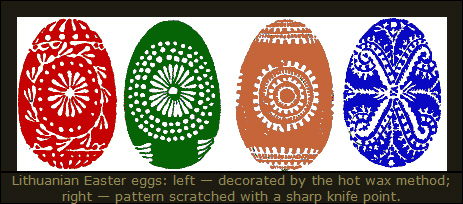
Decoration of Easter eggs - margučiai - is a very ancient custom in Lithuania. At the foot of the Gediminas Hill in Vilnius archaeologists have found eggs made of bone and clay, which shows that this custom was known in Lithuania as early as the 13th Century. Easter eggs are also mentioned by Martynas Mažvydas in his dedication to his book "Hymns of St Ambrosius" (1549). Easter eggs were particularly popular at the turn of the 20th Century. They were decorated both by grown-ups and children, by rich and poor. Some were dyed in a single colour, some were decorated with patterns.
Decorations are produced by painting patterns on warm eggs with the tip of a stick or a pinhead dipped in hot wax. Droplet-shaped strokes are grouped in patterns, twigs of rue, little suns, starlets and snakes. The most frequent pattern is that of a sun, like those on large and small distaffs. Smaller patterns are joined by dots and wavy lines into larger ornaments. Their combinations are so varied that is is impossible to find two identical Easter eggs. Every village has its own best egg-decorators.
- Bookmark :
- Digg
- del.icio.us
- Stumbleupon
- Redit it
“Thou shall not speak evil of another Lithuanian”
- Posted by - (1) Comment
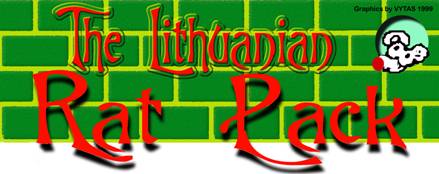
The Lithuanian Rat Pack was founded in the U.S. in July 1999 as a discussion group by Rimgaudas Petras Vidziunas Mesa, Arizona USA. Any type of discussions relating to culture, history, current events, politics, economics, genealogy, geography, books, poems, travel, visas about Lithuania are allowed. Golden rule is "thou shall not speak evil of another Lithuanian".
Lithuanian-American Club activities are announced. Growing up Lithuanian in the Americas stories are encouraged.
The Lithuanian Rat Pack started and still is on yahoogroups.com.
They also have a Facebook page:
http://www.facebook.com/pages/The-Lithuanian-Rat-Pack/293010015300
Join them and have some fun!

Rimgaudas P. Vidziunas
Mesa, Arizona
USA
Other Lithuanian organisations and Lithuanian genealogy websites in the U.S.
LITHUANIAN GENEALOGY

Lithuanian Global Genealogical Society
Lithuanian Global Genealogical Society (LGGS) is a non-profit society that provides this site for the use of LGGS members, fellow genealogists, and those just starting their research on Lithuania, and family genealogy. Our mission is to collect, preserve, and disseminate knowledge and information about Lithuanian genealogical and related historical, biographical, and heraldic data; to inculcate and promote interest in accurate research in these fields; to issue publications in various forms of media; and to encourage, promote, and provide genealogical education and scholarly training for all interested in these endeavors. The society is composed of a host of volunteers who take time out of their ordinary lives to further our mission.
LITHUANIAN ORGANISATIONS IN THE U.S.

Lithuanian American Community, Inc.

Lituanus (English)
Journal dedicated to Lithuanian and Baltic art, history, language, literature, and other cultural topics, published by LAC
Lithuanian Foundation, Inc. (Lithuanian)
Lithuanian Foundation, Inc. (English)
Arizona Chapter of Lithuanian-American Community, Inc.
California Lithuanian Community
Philadelphia Area Lithuanian-American Community
Los Angeles Lithuanian Community
Lithuanian-American Community of Minnesota (LACMN)
Lithuanians in Florida
Lithuanian American Community, Inc. - New York District
Save Our Lady of Vilnius
Portlando Lietuvių Amerikos Bendruomenò (Portland)
Lithuanian-American Community Inc. - San Diego Chapter
Washington Chapter of Lithuanian-American Community, Inc.
Lithuanian-American Community of Colorado
Cleveland's Lithuanian Community
- Bookmark :
- Digg
- del.icio.us
- Stumbleupon
- Redit it
Verbų sekmadienis – Palm Sunday
- Posted by - (1) Comment
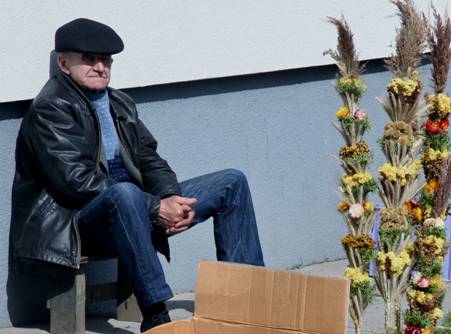
The Christian world celebrates Jesus' noble entry into Jerusalem on the last Sunday before Easter. In Lithuania this day is called Verbų Sekmadienis – Palm Sunday. When Christianity came to Lithuania, plants which sprouted earliest were honoured during spring feasts. Even now, willows, osiers and weeping willows are consecrated on Palm Sunday. Mythological folklore relates that one of the willows, called Blindė, had been a very fertile woman, bearing numerous children. Earth, the most fertile mother was jealous of her. When Blindė walked through a wetfield, her feet sank into the mud. Blindė turned into a willow tree out of great sadness.
The osier, with male spores was regarded as an unusual tree. Folklore tells that the osier grew out of a secretly murdered man. A fife made of osier wood, speaks in a man's voice. Evil spirits avoid it because of its red color.
Palms of Vilnius (Verbos)
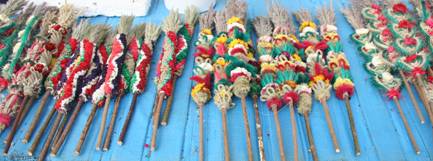
These decorative, dried plant bouquets had no ritual purpose earlier. However now with the addition of juniper and osier branches they have become Palm Sunday tokens. The Vilnius' palm is today produced in fifteen villages in the Vilnius region.
Painters were among the first to show interest in palms. In 1847 K.Ruseckas painted a young girl with a bunch of palms in her hands and in 1913 he presented palms in colorful folk art and trade show posters. The origin of Palms of Vilnius has not been determined. It is thought that they could have been ancient Vilnius trade guilds' processional adornments, manufactured mimicking Jesus' entry into Jerusalem. Vilnius' Palms are created using dried wild plants, forest and garden blossoms and other plant parts. About thirty different plants are used, among them are mosses, berry greens, timothy grass, St. John's worth, tansy, yarrow and many others.
The making of palms begins the day after Shrove Tuesday and continues till Palm Sunday. This is a project that involves the entire family, however most often it is women's work. The most popular palms are roller shaped. Now there are wreath and whip shaped, flat and puffed out.
 |
PALM SUNDAY PALMS [ a.k.a. VERBOS ]
The Christian world celebrates Jesus' noble entry into Jerusalem on the last Sunday befor Easter. In Lithuania this day is called Verbø Sekmadienis – Palm Sunday. When Christianity came to Lithuania, plants which sprouted earliest were honored during spring feasts. Even now, willows, osiers and weeping willows are consecrated on Palm Sunday. Mythological folklore relates that one of the willows, called Blindë, had been a very fertile woman, bearing numerous children. Earth, the most fertile mother was jealous of her. When Blindë walked through a wetfield, her feet sank into the mud. Blindë turned into a willow tree out of great sadness. PALMS of VILNIUS [ a.k.a. VILNIAUS VERBOS ] |
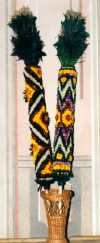 Verbos made by Leokadija Šalkovska. Photo by Gediminas Svitojus |
- Bookmark :
- Digg
- del.icio.us
- Stumbleupon
- Redit it
We wish there were more people like Mr. Kaminskas
- Posted by - (0) Comment
![]() Ref article: https://vilnews.com/?p=4748
Ref article: https://vilnews.com/?p=4748

This is absolutely right! We wish there were more people like Mr. Kaminskas: 1) Being able to recognize the problem, 2) Being able to speak about it openly and freely as people in democratic societies should! Kaminskas is 100% right saying that this time we need "revolution from below." We agree with him that we probably will not see the change in our life time but while we are here we should work on it and do not give in to populist/neo-liberal/19th century capitalist ideologies that prevent today in Lithuania.
America Ltv
- Bookmark :
- Digg
- del.icio.us
- Stumbleupon
- Redit it
VilNews e-magazine is published in Vilnius, Lithuania. Editor-in-Chief: Mr. Aage Myhre. Inquires to the editors: editor@VilNews.com.
Code of Ethics: See Section 2 – about VilNews. VilNews is not responsible for content on external links/web pages.
HOW TO ADVERTISE IN VILNEWS.
All content is copyrighted © 2011. UAB ‘VilNews’.

 Click on the buttons to open and read each of VilNews' 18 sub-sections
Click on the buttons to open and read each of VilNews' 18 sub-sections 



















.jpg)



